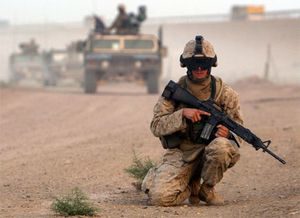 The Volunteer Income Tax Assistance (VITA) program is offering free tax help to members of the military and their families. The assistance is available both on and off base, including sites located overseas.
The Volunteer Income Tax Assistance (VITA) program is offering free tax help to members of the military and their families. The assistance is available both on and off base, including sites located overseas.
VITA provides tax help through staff that has been specially trained to handle military-related tax issues. Some of those issues include tax benefits for serving in a combat zone, unique tax filing and payment deadlines based on service status, child and dependent card tax credits and military-specific Earned Income Tax Credit (EITC) rules.
When things are more dangerous, there are income tax benefits. Serving in a combat zone or in an area where imminent danger exists qualifies a service member for income tax exclusions on extra income they receive.
This applies on a monthly income basis, so any pay received during any part of a month of service in a combat zone may be excluded. The combat pay exclusion for commissioned officers is capped at the highest enlisted pay, including any hostile fire or imminent danger pay received.
When an enlisted person serving in a combat zone decides to reenlist, that person receives a reenlistment bonus. That bonus is also excluded from gross income if it is received when the person was serving in a combat zone.
Income received outside a combat zone is not excluded from income unless the pay is designated as Imminent Danger Pay (IDP) and Hostile Fire Pay (HFP). It is extra pay to personnel who serve in an area to provide direct support of military operations in a combat zone or an area that is designated as particularly dangerous. The Department of Defense lists those particular areas and the time for which the hostile fire pay is issued.
Military duty in areas of the world that have extremely low quality of life, or QoL, may qualify for QoL extra pay, but that extra income may not be excluded from income tax.
If a service member is hospitalized by an injury or serious illness while serving in a combat zone or IDP, their income is not subjected to tax for the duration of their hospitalization up to two years. Disability benefits and other kinds of income related to a service member’s injuries or illness may also receive specialized tax treatment.
While no areas are listed as designated current combat pay zones so far this year, there are dozens of locations in the world designated as Imminent Danger Pay Areas. Each service branch is responsible for certifying a person’s entitlement to the military pay exclusion on the Form-W2 that is submitted to the IRS.
The current IDP rate is $7.50 per day, with a maximum of $225 per month. You can imagine how helpful it is for that extra pay for serving under extreme risk to be protected from income tax. This kind of hazardous duty pay has been a heated debate topic for many years as America’s armed forces have been stretched across the globe into many hostile areas and the Department of Defense struggles with budget cuts.
All of these military tax programs and more are overseen by the Armed Forces Tax Council (ATFC) which provides worldwide assistance to military personnel. If you have questions about this or past tax years and your ability to qualify for military service-related tax exclusions or credits, contact us at McRuer CPAs for more information.
 is now
is now 
